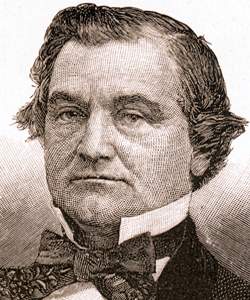William Lowndes Yancey (American National Biography)
Scholarship
The election of Abraham Lincoln in November convinced Yancey that the time had arrived for immediate secession. He was elected to represent Montgomery County in the secession convention and was appointed chair of the committee that drafted the ordinance of secession. When the Confederacy was organized in February 1861, President Jefferson Davis nominated him together with Pierre A. Rost-Denis and A. Dudley Mann as a delegation to present the South's case to the European powers. Yancey arrived in London on 29 April and spent the next year vainly seeking diplomatic recognition for the new government. In November 1861 the Alabama legislature unanimously elected Yancey to the Confederate Senate. He then resigned his diplomatic mission and managed to return to the Confederacy via Havana and New Orleans. He took his senate seat on 27 March 1862.
Yancey soon became a leading states' rights opponent of the nationalistic Davis administration. He sought extensive exemptions from the Conscription Act and proposed the highly unpopular exemption of an overseer on every plantation with twenty or more slaves whose owner was absent. He fought to restrict the army's impressment of goods, and he strongly opposed allowing the Confederate Supreme Court to hear appeals from state supreme courts. During the debate on the bill to create the Supreme Court, in February 1863, he became involved in a violent encounter with Senator Benjamin Hill of Georgia on the senate floor and suffered injuries that forced him to absent himself for several days.
Yancey soon became a leading states' rights opponent of the nationalistic Davis administration. He sought extensive exemptions from the Conscription Act and proposed the highly unpopular exemption of an overseer on every plantation with twenty or more slaves whose owner was absent. He fought to restrict the army's impressment of goods, and he strongly opposed allowing the Confederate Supreme Court to hear appeals from state supreme courts. During the debate on the bill to create the Supreme Court, in February 1863, he became involved in a violent encounter with Senator Benjamin Hill of Georgia on the senate floor and suffered injuries that forced him to absent himself for several days.
J. Mills Thornton, "Yancey, William Lowndes," American National Biography Online, February 2000, http://www.anb.org/articles/04/04-01080.html.
William Lowndes Yancey (Congressional Biographical Directory)
Reference
YANCEY, William Lowndes, (uncle of Joseph Haynsworth Earle), a Representative from Alabama; born at the Falls of the Ogeechee, Warren County, Ga., August 10, 1814; attended preparatory school and Williams College, Williamstown, Mass.; studied law in Sparta, Ga., was admitted to the bar in 1834 and commenced practice in Greenville, S.C.; moved to Cahawba, Ala., in 1836; temporarily abandoned the practice of law and became a cotton planter; editor of the Cahawba Democrat and the Cahawba Gazette; moved to Wetumpka, Ala., in 1839 and resumed the practice of law; member of the State house of representatives in 1841; served in the State senate in 1843; elected as a Democrat to the Twenty-eighth Congress to fill the vacancy caused by the resignation of Dixon H. Lewis; reelected to the Twenty-ninth Congress and served from December 2, 1844, to September 1, 1846, when he resigned; moved to Montgomery, Ala., in 1846; delegate to the Democratic National Convention in 1848, 1856, and 1860; member of the State constitutional convention which convened in Montgomery January 7, 1861; appointed chairman of the commission sent to Europe in 1861 to present the Confederate cause to the Governments of England and France; elected to the first Confederate States Senate February 21, 1862; died at his plantation home, near Mongtomery, Ala., July 26, 1863; interment in Oakwood Cemetery.
“Yancey, William Lowndes,” Biographical Directory of the United States Congress, 1774 to Present, http://bioguide.congress.gov/scripts/biodisplay.pl?index=Y000003.







